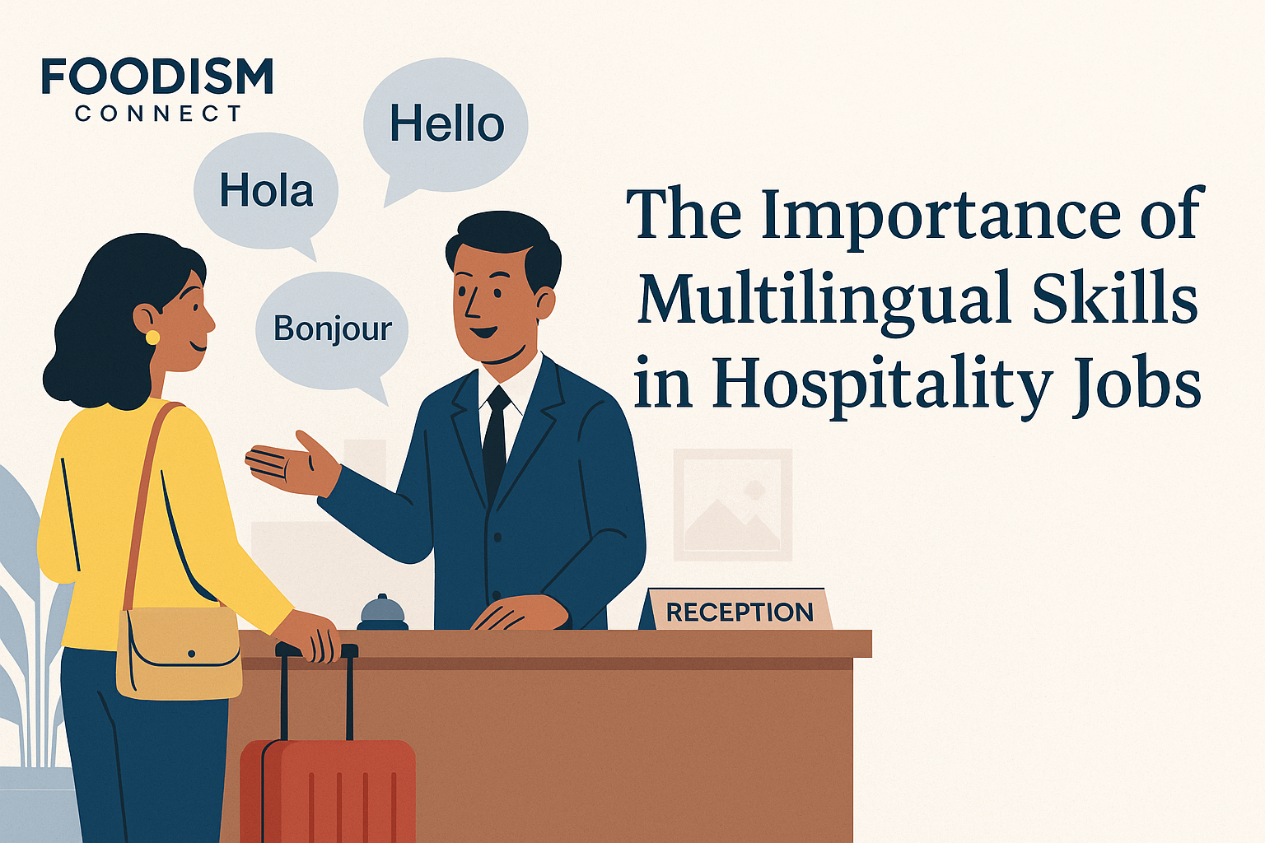
Importance of Multilingual Skills in Hospitality Jobs

In the zestful world of Indian hospitality, one skill stands out as both timeless and future-ready: the ability to speak multiple languages, known as multilingual skills. Whether you are welcoming international guests at a luxury hotel in Mumbai, assisting tourists at a resort in Goa or coordinating with global suppliers for a cruise line, multilingualism is a game-changer. As travel has become more accessible and the tourism industry continues to expand, the demand for multilingual professionals in hospitality jobs has never been higher.
What is Hospitality? It is about people! Connecting people best through languages. The way we speak to guests, understand their preferences, and resolve their concerns all define the kind of experience you offer. Here, multilingual skills are a concept far beyond translation - they signify empathy, professionalism, and the ability to serve with cultural sensitivity. In today’s ever-evolving hospitality landscape, being multilingual is not only a bonus but it’s a core requirement for hospitality careers that aspire to be truly world-class.
Here, with Foodism Connect, we will explore how multilingualism enhances guest experience, opens career opportunities, builds trust and shapes the future of hospitality hiring too.
Multilingualism: The Key to Exceptional Guest Experience
Seamless communication is the heart of hospitality; guests from different parts of the world not only bring different languages but also unique expectations and comfort zones. When any hotel staff - front office executives, concierges or tour guides can communicate in guests’ native language, even just basic greetings or polite expressions, it builds an instant connection. Such gestures can make the guests feel respected and welcomed.
For example, a Spanish-speaking couple is in Kerala for their honeymoon, they would feel more at ease if greeted on a friendly note: Holla! Buenos dias. Cómo estás? Also, if there is a Japanese business traveller, is greeted: Konnichiwa! All these personalised communications set a tone of trust and satisfaction, leading to optimistic reviews from the guests and brand loyalty.
Multilingual Skills Enhance Employability and Career Growth
From luxury hotels to international resorts or cruise lines, employers are actively seeking professionals with foreign language proficiency. Knowledge of multiple languages like Spanish, French, Arabic or German, along with other regional Indian languages like Marathi, Bengali or Tamil, can open the door to a wide range of hospitality job opportunities in India as well as abroad.
Multilingual professionals can demand higher salaries and are eligible for international placements as well. They also have chances to get promoted faster, mainly in customer-facing roles like tour coordinator, front office executive or any management role in a multinational hotel chain. Language skills can significantly enhance your resume.
Cultural Sensitivity and Trust-Building
Culture and language go hand in hand; a multilingual professional is often more culturally aware and sensitive, with traits essential to deal with international guests. This cultural awareness helps to avoid misunderstandings, prevent service errors and allow staff to tailor their approach as per guest preferences.
For example, understanding dietary restrictions during Ramadan or knowing the wine pouring culture of Japanese - all these are easier to understand when one is familiar with the language and the culture behind it. Such a level os service builds deep trust with international guests, leading to better feedback, repeat visits and stronger brand reputation. In an industry where experience is everything, professionals with cultural fluency and multilingualism are a major differentiator!
Operational Efficiency and Team Collaboration
Multilingualism is not only beneficial in guest handling but also effective in internal team dynamics. It acts as a bridge to overcome language barriers, as the hospitality industry encompasses a diverse team. It leads to a smoother connection between departments with better execution of service protocols, supporting an inclusive workplace. Multilingual staff contribute better to guest complaints. In an aggressive situation like a billing dispute, being able to communicate calmly in guests’ native language can prevent escalation of the matter and reassure guests that they are in capable hands.
Keeping Up With Global Travel Trends
Social media and digital booking platforms have brought travellers from all over the globe to unexpected destinations. Even small homestays or boutique cafes now serve international clientele. In the vast Indian hospitality landscape, businesses must keep up with travel trends by hiring multilingual staff. Hotels offering multilingual customer support, providing information brochures in different languages, are often highly rated on platforms like Booking.com or TripAdvisor. Multilingual capabilities of a staff allow hospitality businesses to thrive and promote themselves in foreign markets and build international partnerships. So, multilingualism is not only beneficial for better customer service but also for revenue generation.
Multilingualism is the Future of Hospitality
Travel has become more global, and guests are more diverse, and multilingualism is emerging as a must-have skill for hospitality professionals. For job seekers, learning other languages can simply be a game-changer and for recruiters hiring multilingual talent or investing in language training can be a strategic move to pay off higher guest satisfaction and international appeal.
At Foodism Connect, we understand that language proficiency is more than just a revenue highlight; rather, it is a core competency for modern hospitality roles. Our platform helps connect employers with multilingual professionals ready to elevate their service standards across the industry. Download Foodism Connect and get started! Because there is no better way to make guests feel welcomed, respected and cared for than by speaking their language.
Related Blogs

Festival Hospitality: What Food Events Teach About Guest Management & Staffing
112 Views

Little Guests, Big Smiles: How Hotels Design Family-Friendly Experiences
115 Views

Regional Cuisines, Local Talent: How Culinary Diversity Shapes Hospitality
180 Views

AI in Kitchens & Hotels: What the Forum Revealed About Tech Skills in Hospitalit
188 Views

Contingency Planning for Festival Staff Shortages: Essential Tips
136 Views